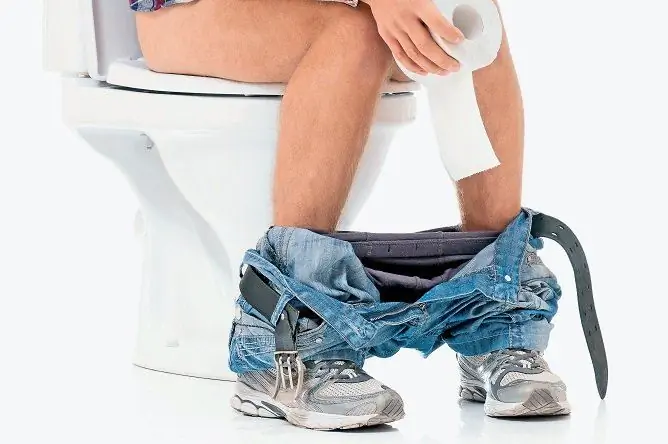Which doctor to contact for hemorrhoids
The content of the article:
- Which doctor to contact for hemorrhoids
- How to prepare for an appointment with a proctologist
- How is the appointment with the proctologist
- Features of going to a doctor for hemorrhoids in women
- Which doctor should I contact for hemorrhoids in the later stages?
- Video
Which doctor to go to for hemorrhoids is a question that is relevant for many people. If you do not start to treat the disease in time, it progresses rapidly, and in the later stages it is less amenable to therapy. Therefore, when the first symptoms of the disease appear, it is recommended to immediately consult a doctor. A specialist who treats diseases of the rectum is called a proctologist. At later stages, this doctor may conduct an examination, but the surgeon will already deal with the treatment.
Which doctor to contact for hemorrhoids
A proctologist, or coloproctologist (narrower specialization - treatment of the colon and rectum) is the first doctor after a general practitioner or family doctor who should be consulted to solve the problem of hemorrhoids. He also has the right to write out an appointment to other specialists if additional consultation is required. For example, a visit to a gynecologist is mandatory for women.

If symptoms of hemorrhoids appear, you should immediately contact a proctologist
An examination by a proctologist is recommended if the following symptoms are troubling: soreness, rectal bleeding, foreign body sensation in the rectum, heaviness in the pelvic or rectal region.
The proctologist conducts a comprehensive examination, prescribes conservative therapy and monitors its progress, correcting it if necessary. A doctor of this specialization, as a rule, is on the staff of any polyclinic.
Many patients face psychological barriers, are afraid or embarrassed to see a proctologist. In fact, the examination procedure is practically painless, even if a sigmoidoscopy or other probe examination is performed. Surgical treatment of advanced pathology is a much more complicated process, so the visit should not be postponed.
How to prepare for an appointment with a proctologist
It is necessary to prepare for an examination by a proctologist. The night before, it is better to skip dinner or eat something light, porridge or broth. In the morning on the day of intake, you should refrain from eating. If there was no morning bowel movement, it is recommended to take a laxative or use a micro enema. Be sure to pay special attention to personal hygiene.
In the later stages of hemorrhoids, bowel cleansing and other preparatory procedures will be performed by the doctor himself.
In order not to waste time in the office, even before visiting the doctor, you need to recall all the complaints, symptoms, as well as the periodical and features of their occurrence. If necessary, it is better to record this data. You need to pay attention to pain during bowel movements, color and consistency of feces, and other unpleasant sensations that, according to the patient, may be associated with the disease. The help in collecting anamnesis for the doctor is the patient's openness, his awareness of the course of the pathological process.
How is the appointment with the proctologist
Depending on the stage of hemorrhoids, the diagnosis may vary, but the basic technique consists of the following points:
- Collection of anamnesis, i.e. history of a specific disease and complaints. At this stage, the doctor can suggest a preliminary diagnosis, which will then be checked laboratory and instrumental.
- Inspection - it is divided into general and local. In general, the doctor assesses the condition and appearance of the patient as a whole. More informative is a local examination, which the coloproctologist performs manually (manual examination) or using instruments (holders, mirrors). First of all, the condition of the mucous membrane, the degree of development of hemorrhoids, the presence or absence of the wound surface are assessed.
- Clarifying laboratory examinations. After the examination, the doctor will send for a general and biochemical blood test, a coprogram (fecal analysis), a bacterial culture of feces may also be required to check for a bacterial infection.
- Instrumental examination. To do this, an anoscope is inserted into the anus, and the image is displayed on the screen. Now the doctor evaluates in detail what he could not see during the initial examination.
- At the end of the appointment, a presumptive diagnosis is announced, which can be called final (as well as clarified or changed) only after the test results, sigmoidoscopy data come. After that, treatment is prescribed.
Features of going to a doctor for hemorrhoids in women
For women, the proctological examination is the same as for men. But the characteristics of the female body are such that they often have hemorrhoids during pregnancy and in the postpartum period. In addition, inflammatory processes in the rectal region may be associated with inflammatory or infectious-inflammatory diseases of other pelvic organs. Therefore, the gynecologist is also engaged in monitoring such patients.
Often it is the gynecologist who becomes the first doctor to whom the patient turns to with hemorrhoids, in other cases, hemorrhoids can be detected during a routine gynecological examination. The doctor will find hemorrhoids with external hemorrhoids. Soreness will indicate internal hemorrhoids (with a bimanual gynecological examination, the rectal wall, which lies immediately behind the posterior fornix of the vagina, may be irritated). The presence of secretions, anal fissures, a clearly defined venous pattern in the anus, and seals can suggest hemorrhoids.
Sometimes hemorrhoids in the postpartum period develop together with varicose veins in the vagina. Then a competent gynecologist will necessarily examine the woman himself, or send her to a proctologist.
The gynecologist can also monitor the intake of drugs prescribed for the treatment of hemorrhoids and adjust therapy in order to weed out drugs that are potentially harmful to the mother and fetus.
Which doctor should I contact for hemorrhoids in the later stages?
The patient is referred by a proctologist for a consultation with a surgeon if treatment with pharmacological agents did not have an effect, or if a late stage of the disease was detected during the initial treatment. It can be either a narrow specialist - a coloproctologist surgeon or a general surgeon.
He examines the patient, taking into account the information received from the proctologist. Based on the data, the surgeon determines the feasibility of the operation and draws up its plan.
Surgery planning may include a detailed examination and consultation with a phlebologist - a vein disease specialist. He assesses the blood flow in the veins of the hemorrhoidal plexus, the state of the vessels, and can prescribe contrast angiography.

In the later stages of hemorrhoids, a surgeon is involved in treatment
With hemorrhoids, both minimally invasive interventions are performed on an outpatient basis, after which the patient will soon be able to return to a normal lifestyle, as well as massive surgical operations for health reasons. Wherever possible, preference is given to the first category, which includes:
- ligation with latex rings - the method involves putting on a special elastic ring on the base of the hemorrhoid. The ring compresses the vessels, impairs blood flow in the hemorrhoidal veins, due to which the node is rejected on its own;
- dearterization of hemorrhoids. During this manipulation, an artery is stitched that carries blood to the crowded vein;
- sclerotherapy. A substance is injected into the vessels of the rectum, which provokes the growth of connective tissue. When the lumen closes, blood does not flow into the swollen nodes;
- photo- and electrocoagulation - cauterization of hemorrhoids with a heat beam or electric arc. Effective in stopping bleeding and treating stage 2 and 3 hemorrhoids.
Invasive methods include:
- radical excision of hemorrhoids according to Milligan-Morgan. Surgical intervention, which since the time of its invention has acquired many modifications, consists in the complete removal of hemorrhoids, followed by coagulation and suturing of the vessels.
- Longo operation. This is a less traumatic version of the previous surgery, which requires a stapler. After excision of the nodes, the hanging mucosa with special staples is attached to the whole tissues, and the lumen of the vessels narrows.
If there is no necessary specialist in the village, then a local therapist can conduct an examination and prescribe medication for hemorrhoids. Stop bleeding from hemorrhoids within the power of an ambulance doctor. Gynecologist, proctologist, phlebologist, surgeon - any of these doctors will provide assistance, the main thing is to seek help in a timely manner.
Video
We offer for viewing a video on the topic of the article.

Nikita Gaidukov About the author
Education: 4th year student of the Faculty of Medicine No. 1, specializing in General Medicine, Vinnitsa National Medical University. N. I. Pirogov.
Work experience: Nurse of the cardiology department of the Tyachiv Regional Hospital No. 1, geneticist / molecular biologist in the Polymerase Chain Reaction Laboratory at VNMU named after N. I. Pirogov.
Found a mistake in the text? Select it and press Ctrl + Enter.







